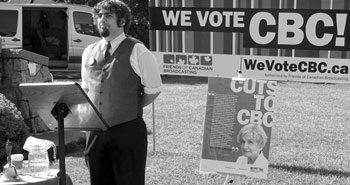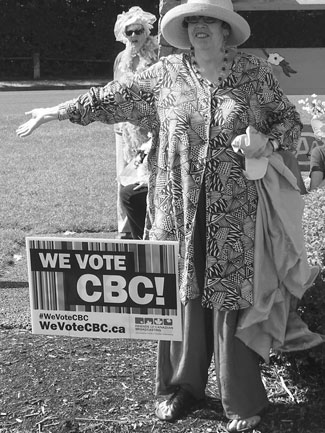Sep
15
We Vote CBC in Victoria!
Sep 2015
By Penny Pitcher
Photos by Penny Pitcher
"The lady of the house in Halifax is often busy with her domestic tasks before the gentleman of the house in Vancouver has finally settled down for the night." So said Leonard Brockington on November 2, 1936, the first day for the Canadian Broadcasting Corporation, the CBC.
 |
| MC Dave Morris, observed that the gathering was a celebration of the placing of 799 "We Vote CBC" lawn signs in the federal riding of Victoria - the largest number of signs in any single area in the country. Dave also played recorded greetings from Mayor Dennis O'Keefe in St. John's, NFLD. who concluded by saying that there is "no force greater" than the CBC and "now we need it more than ever." |
Although some local stations in Canada predate CBC's founding, CBC is the oldest existing broadcasting network in Canada. Because Canada is a country with a huge landmass and a relatively low population, it has been a challenge to develop communication structures to connect the widely separated communities of the north. With two official languages, French and English, the CBC provides services in both of these, as well as making programming available in Aboriginal languages for those who speak neither. And finally, from its inception, the CBC has provided Canadian content in fields ranging from sports to culture in order to preserve a unique Canadian identity.
In 1929, the Aird Commission on public broadcasting recommended the creation of a national radio broadcast network. A major concern was the growing influence of American radio broadcasting as US-based networks began to expand into Canada. Meanwhile, Canadian National Railways was making a radio network to keep its passengers entertained and to give it an advantage over its rival, Canadian Pacific. This, the CNR Radio, is the forerunner of the CBC.
 |
| Councillor Pamela Madoff (representing Victoria's Mayor, Lisa Helps) unveils the 800 "We Vote CBC" lawn sign. She asked who, other than the CBC, would have played Gordon Lightfoot's 7 minute song, The Wreck of the Edmund Fitzgerald? |
Emily Carr once wrote, “It is wonderful to feel the grandness of Canada in the raw, not because she is Canada, but because she's something sublime that you were born into, some great rugged power that you are a part of.”
CBC’s funding differs from that of the public broadcasters of many European nations, which collect a licence fee, or those in the United States, such as PBS and NPR, which receive some public funding but rely to a large extent on contributions from viewers and listeners. A Nanos Research poll from August 2014 conducted for Asper Media (National Post, Financial Post) showed 41% of Canadians wanted funding increased, 46% wanted it maintained at current levels, and only 10% wanted to see it cut. Friends of Canadian Broadcasting, a national, non-partisan group, is campaigning to ensure that CBC is adequately funded and remains a crown corporation. To bring attention to the present state of public broadcasting, Friends of Canadian Broadcasting has been asking Canadians to voice support by placing lawn signs with the message, “We Vote CBC” in front gardens. As of August 1, B.C Day, 799 lawn signs had been placed in the federal riding of Victoria, the largest number of signs in any riding engaged in the campaign in Canada. Thus it was that the 800 sign was symbolically placed at Mile 0 during a ceremony that saw the likes of Sir John A. MacDonald and Emily Carr, the Raging Grannies and Pamela Madoff, Mike Woodley and Dave Morris, and the voice of Dennis O’Keefe, Mayor of St. John’s, NFLD.
Master of Ceremonies, Dave Morris, welcomed those in attendance and introduced Sir John A. MacDonald (Gerry Underhill). The former Prime Minister said that he had been “dumbfounded” to learn that in addition to a railway and a highway uniting this country, now there was an invisible ribbon, a connector, called the Canadian Broadcasting Corporation. He urged everyone to keep raising their “voices and keep insisting on the CBC’s importance.”
Alice Munro, Canada’s Nobel laureate, has spoken of her debt to the CBC. Although unable to attend the event in Victoria, she sent along a picture of herself. In her place, Emily Carr (Molly Newman) discussed the important role the CBC played, and continues to play, in promoting Canadian culture. In fact, aside from her career as a painter, Carr was a respected and popular writer. One of her books, Klee Wyck, published in 1941, documented her experiences living with the First Nations people in British Columbia. It won the Governor General's Award that same year. In the 1940s excerpts from Klee Wyck had been read as part of special CBC Radio broadcasts. It was as a result of these readings that many Canadians were first introduced to Emily Carr, the writer.
In a pre-recorded message, His Worship, Dennis O’Keefe. Mayor of St. John’s, NFLD., assured the people of Victoria that he shares their conviction of the importance of Canada’s public broadcaster. He argued that there is “no force greater” than the CBC and “now we need it more than ever.”
Councillor Pamela Madoff, representing Victoria’s Mayor, Lisa Helps, laughingly asked what other station would have played Gordon Lightfoot’s Wreck of the Edmund Fitzgerald given that it is seven minutes long! Then, with a flourish, she unveiled the 800 “We vote CBC” lawn sign. The Royal BC Museum has since acquired this sign for its collection.
To conclude the event, The Raging Grannies sang a song written for the occasion. Those gathered clapped and sang along to the chorus:
“Where are they now, the voices of Canada
That spoke with different accents but sounded like us?
They’ve all been dumped in a money making melting pot
Carved with commercials that sell us mush.”
Organizers Joanne Manley and Moira Walker urge everyone to keep the CBC and its continued existence in mind. To echo the sentiment of Mayor O’Keefe, “Long live the CBC.”
